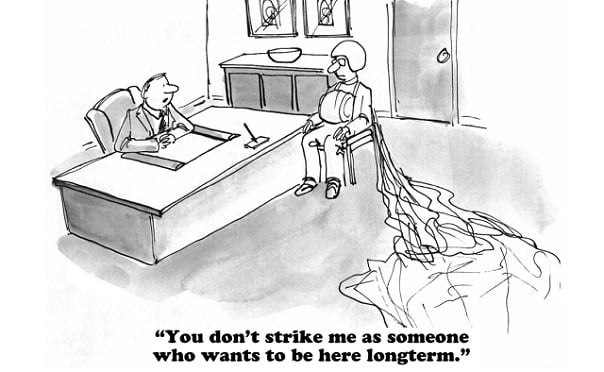 A survey of CFOs found that 44 percent are not at all likely to hire a candidate with a history of job hopping because they want to avoid losing them in the future. (Image: Shutterstock)
A survey of CFOs found that 44 percent are not at all likely to hire a candidate with a history of job hopping because they want to avoid losing them in the future. (Image: Shutterstock)
Millennials may think it's smart to change jobs often, but prospective employers aren't so sure, according to the Robert Half report, "Should you job hop?"
Robert Half commissioned a survey of 1,000 U.S. workers and found that seventy-five percent of employees ages 18 to 34 view job hopping as beneficial, compared to 59 percent of workers ages 35 to 54 and 51 percent of those 55 and older. For all respondents, two-thirds say that workers with a college degree or higher see the most benefit in changing jobs every few years.
Recommended For You
However, a separate survey of CFOs found that 44 percent are not at all likely to hire a candidate with a history of job hopping because they want to avoid losing them in the future. But that can depend somewhat on the size of the company, as 51 percent of CFOs at companies with more than 1,000 employees said a history of frequent job changes isn't relevant if the candidate is the right fit.
Still, even workers realize there's a real risk of job hopping, with nearly half (46 percent) conceding that the biggest drawback is being perceived as a flight risk.
Workers and employers are close to agreeing on one thing: When asked the number of role changes in 10 years that constitute a job hopper, workers say five and CFOs say six. "While job hopping can have benefits, too many employment changes can raise red flags with hiring managers," says Paul McDonald, senior executive director for Robert Half. "Professionals should take time to weigh the pros and cons before making a career move."
McDonald also offers tips for employers to attract and retain workers, including making sure their company feels like a great place to work by promoting values important to workers, having a positive corporate culture and attractive benefits, and by offering professional development opportunities, particularly for young workers.
"In today's candidate-short market, keeping key performers engaged should be top of mind for managers," McDonald says. "Businesses worried about losing talent to the competition should focus on improving corporate culture and strive to be the type of company employees want to stay with long term."
Employers are getting more creative about attracting and retaining talent, including looking at previously untapped talent pools to fill positions, according to HRDive.
"Many now offer flexible work schedules, paid leave, training and voluntary benefits to appeal to candidates and keep workers happy," HRDive writes. "More companies are hiring contingent workers to get the high-skilled workers they need and remain agile at the same time. And even in retail, an industry known for low wages and high turnover, employers raising wages and offering bonuses to compete in the war for talent."
© Touchpoint Markets, All Rights Reserved. Request academic re-use from www.copyright.com. All other uses, submit a request to [email protected]. For more inforrmation visit Asset & Logo Licensing.







